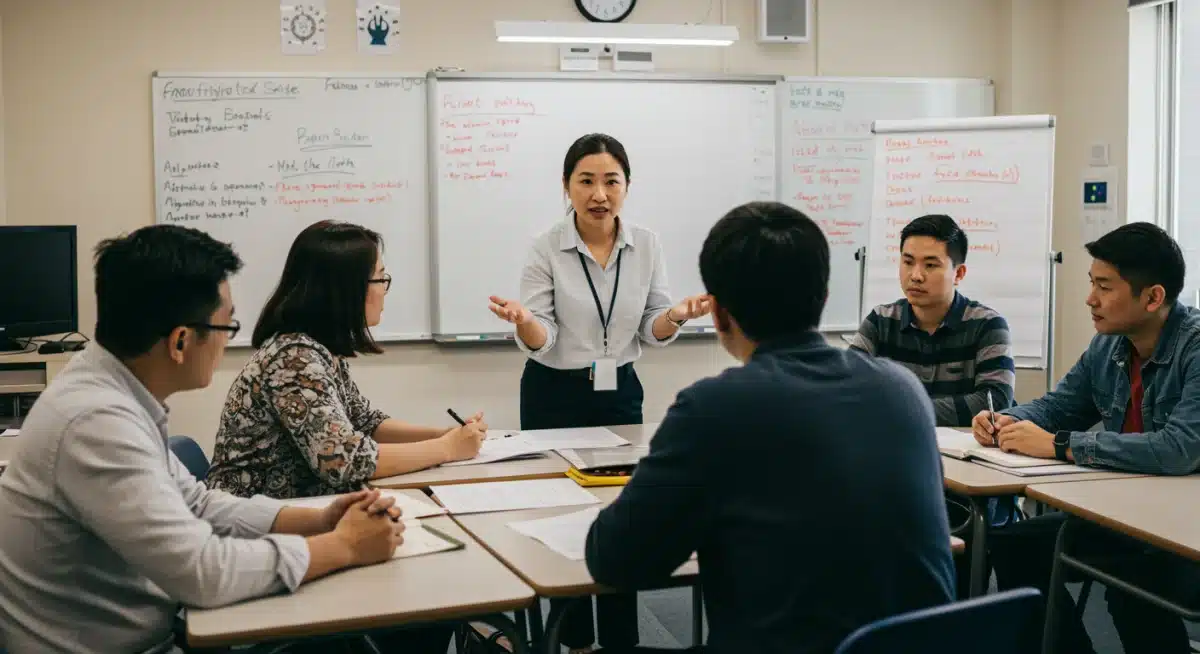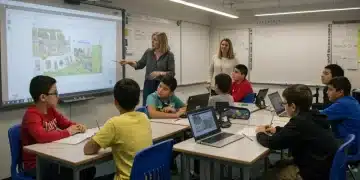Parental Involvement in Schools: New 2025 Guidelines

New 2025 guidelines are redefining parental involvement in schools, aiming to significantly boost academic achievement through enhanced family engagement and collaborative educational frameworks nationwide.
Parental Involvement in Schools: New Guidelines for 2025 Promoting Academic Achievement (RECENT UPDATES)
Breaking today, significant updates to educational policy are poised to transform how families engage with learning institutions. The newly unveiled Parental Involvement in Schools: New Guidelines for 2025 Promoting Academic Achievement (RECENT UPDATES) are designed to foster deeper connections between homes and classrooms, ultimately aiming to elevate student performance across the board. What do these changes mean for your family and community?
Understanding the Core of the 2025 Guidelines
The recently released 2025 guidelines mark a pivotal shift in educational philosophy, moving beyond traditional volunteerism to embrace a more integrated, holistic approach to parental involvement. These guidelines recognize parents as essential partners in the educational journey, whose active participation directly correlates with improved academic outcomes and student well-being. The emphasis is on creating accessible, inclusive, and meaningful opportunities for all families.
These comprehensive guidelines, developed by a national task force comprising educators, policymakers, and parent advocates, reflect years of research and pilot programs. They seek to standardize best practices while allowing for local adaptation, ensuring relevance and effectiveness across diverse school districts. The overarching goal is to bridge the communication gap and establish robust support systems for students.
Key Shifts in Parental Engagement
- Collaborative Decision-Making: Parents are now encouraged to participate in school governance and policy development, moving beyond advisory roles to active partnership.
- Personalized Learning Pathways: Guidelines advocate for parental input in tailoring educational plans to meet individual student needs and interests.
- Digital Literacy Integration: New resources will be provided to help parents navigate digital learning platforms and support online education effectively.
Strategic Implementation: A Phased Approach
Implementing the 2025 guidelines will occur in phases, beginning with pilot programs in selected districts in late 2024, followed by a nationwide rollout throughout 2025. This phased strategy aims to refine processes, gather feedback, and ensure that schools are adequately prepared for the new demands. Each phase includes extensive training for school staff and parent leaders.
School districts are being provided with toolkits and resources to help them adapt their existing parental involvement programs to align with the new federal standards. These resources include templates for family-school compacts, communication protocols, and strategies for engaging hard-to-reach families. The success of this implementation hinges on strong leadership and a commitment to fostering genuine partnerships.
Resources for Schools and Families
To support this transition, federal and state education departments are allocating funds for professional development and community outreach. These funds will enable schools to hire family engagement coordinators, develop culturally sensitive programming, and offer workshops for parents on topics ranging from academic support strategies to understanding school curricula. The focus remains on empowerment and capacity building for all stakeholders.
Technology’s Role in Enhancing Parental Involvement
The 2025 guidelines place significant emphasis on leveraging technology to enhance parental involvement, recognizing the critical role digital tools play in modern communication and learning. Schools are now mandated to implement user-friendly online portals that provide parents with real-time access to grades, attendance records, assignments, and direct communication channels with teachers and administrators.
This digital transformation aims to break down barriers of time and access, allowing parents to stay informed and engaged regardless of their work schedules or geographical location. Furthermore, the guidelines promote the use of educational apps and online resources that parents can utilize at home to support their children’s learning, making education a continuous process that extends beyond the classroom walls.
Digital Literacy Programs for Parents
- Online Platform Navigation: Workshops offered to parents on effectively using school-specific learning management systems.
- Internet Safety and Digital Citizenship: Education for parents on guiding children through safe and responsible online interactions.
- Educational Resource Access: Training on identifying and utilizing reputable online educational tools and content.
The integration of technology also includes provisions for digital equity, ensuring that families without reliable internet access or devices receive the necessary support. This may involve providing school-issued devices, offering hotspots, or creating dedicated community access points, all with the goal of ensuring no family is left behind in the digital age of education.

Addressing Diversity and Inclusivity in Engagement
A cornerstone of the 2025 guidelines is the explicit commitment to diversity and inclusivity in all parental involvement initiatives. Recognizing the varied backgrounds, languages, and socio-economic statuses of families, the new policies mandate that schools develop culturally responsive strategies to engage every parent. This includes providing translated materials, offering interpreters for school meetings, and structuring events at times and locations convenient for working parents.
The guidelines also encourage schools to actively seek input from diverse parent groups, including those from underrepresented communities, single-parent households, and families with special needs children. The goal is to ensure that all voices are heard and that parental involvement programs are reflective of the entire student body, fostering a sense of belonging and shared responsibility for student success.
Strategies for Inclusive Engagement
Schools are now tasked with moving beyond a one-size-fits-all approach to parental engagement. This involves conducting community needs assessments to identify specific barriers to involvement and then designing tailored solutions. For instance, some schools might offer parenting classes focused on navigating the educational system, while others might host cultural events that celebrate the diversity within their student population, encouraging informal interactions between families and school staff.
Furthermore, the guidelines emphasize the importance of training school staff in cultural competency, enabling them to communicate effectively and build trust with families from all walks of life. This holistic approach to inclusivity is expected to significantly broaden the base of active parental participants, leading to a more equitable and effective educational environment for all students.
Measuring Impact and Accountability
A critical component of the 2025 guidelines is the establishment of robust mechanisms for measuring the impact of parental involvement on student academic achievement. Schools will be required to collect and analyze data related to family engagement activities, student attendance, academic performance indicators, and overall school climate. This data will be used to assess the effectiveness of programs and inform continuous improvement efforts.
Accountability measures are also being put in place to ensure that schools are actively implementing the guidelines and achieving their intended outcomes. This includes regular reporting requirements to state education agencies and opportunities for parents to provide feedback on the quality and accessibility of engagement initiatives. The aim is to create a transparent system where success is celebrated and areas for improvement are promptly addressed.
Key Performance Indicators for Parental Involvement
- Participation Rates: Tracking the number of parents attending school events, parent-teacher conferences, and volunteer opportunities.
- Academic Outcomes: Correlating parental involvement levels with improvements in student grades, test scores, and graduation rates.
- Parent Satisfaction: Surveying parents on their perceived level of engagement and satisfaction with school communication and support.
The data collected will not only serve as an accountability tool but also as a valuable resource for research, helping to identify best practices in parental involvement that can be replicated across the nation. This evidence-based approach is designed to ensure that resources are allocated effectively and that parental engagement truly translates into tangible academic benefits for students.
Preparing for the Future: Training and Support
To ensure the successful adoption of the new 2025 guidelines, extensive training and ongoing support will be provided to school administrators, teachers, and parent leaders. This comprehensive professional development program will cover topics such as effective communication strategies, conflict resolution, cultural sensitivity, and the practical implementation of new family engagement technologies. Training will be available through online modules, regional workshops, and specialized conferences.
Beyond initial training, the guidelines emphasize the importance of continuous learning and support networks. Schools will be encouraged to establish peer-to-peer learning communities for parents and educators, fostering a collaborative environment where best practices can be shared and challenges can be collectively addressed. This sustained support aims to embed the principles of strong parental involvement into the very fabric of school culture.
Furthermore, new federal grants are being made available to support innovative parental involvement programs that align with the 2025 guidelines. These grants will fund initiatives focused on early childhood family engagement, support for parents of students with disabilities, and programs designed to boost literacy and numeracy skills at home. The long-term vision is to create a nationwide ecosystem of robust family-school partnerships that collectively contribute to student achievement.
| Key Point | Brief Description |
|---|---|
| Integrated Approach | Moves beyond traditional volunteering to holistic, essential parental partnership in education. |
| Technology Integration | Mandates user-friendly online portals and digital literacy for real-time access and home support. |
| Diversity & Inclusivity | Requires culturally responsive strategies and translated materials to engage all family types. |
| Accountability Measures | Establishes data collection and reporting to measure impact and ensure guideline effectiveness. |
Frequently Asked Questions About New Parental Involvement Guidelines
The primary goals are to enhance academic achievement, foster stronger school-family partnerships, and create more inclusive educational environments. They aim to empower parents as active participants in their children’s learning journey and school governance.
Schools must implement online portals for real-time access to student information and communication. There will also be support for parental digital literacy, ensuring families can effectively use educational apps and online resources to aid learning.
The guidelines mandate culturally responsive strategies, translated materials, and interpreters. Schools are encouraged to tailor engagement initiatives to diverse family backgrounds, including underrepresented communities and those with special needs children.
Effectiveness will be measured through data collection on family engagement activities, student attendance, academic performance indicators, and school climate. Accountability mechanisms, including regular reporting and parent feedback, will also be in place.
Extensive training, professional development programs, and federal grants will be provided. This support aims to cover effective communication, cultural sensitivity, technology use, and foster ongoing learning communities for both educators and families.
Looking Ahead: Impact and Implications
The roll-out of the 2025 parental involvement guidelines represents a monumental step toward redefining education. The long-term implications suggest a future where schools are not just places of learning but vibrant community hubs, deeply integrated with the families they serve. We anticipate a measurable uplift in student academic performance, particularly in areas where parental engagement has historically been low. Continued monitoring will be crucial to assess the full impact and identify areas for refinement, ensuring these new policies deliver on their promise of a more equitable and effective educational system for all children.





